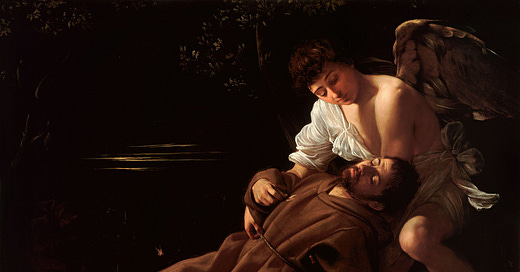St. Francis of Assisi was born wealthy, but when he heard the Gospel in which Christ sends his disciples forth, telling them to take “no sack for the journey, or a second tunic, or sandals, or walking stick,”1 he really took it to heart. He gave up everything he had to become an itinerate preacher. His simplicity and humility led to him being one of the most venerated saints in Church history.
(He was also a favorite of Blessed Carlo Acutis, to whom we’re saying a Novena for the healing of Amelia, as well as Carlo’s beatification.)
The Peace Prayer is often attributed to him, even sometimes called “Prayer of Saint Francis of Assisi,” but he probably didn’t write it. That being said, the Franciscan order highly recommends it—
Lord, make me an instrument of your peace.
Where there is hatred let me sow love;
Where there is injury, pardon;
Where there is doubt, faith;
Where there is despair, hope;
Where there is darkness, light;
Where there is sadness, joy.O Divine Master, grant that I may not so much seek
To be consoled as to console;
To be understood as to understand;
To be loved as to love.
For it is in giving that we receive;
It is in pardoning that we are pardoned;
And it is in dying that we are born to eternal life.
Reading 1
Gal 6:14-18
Brothers and sisters: May I never boast except in the cross of our Lord Jesus Christ, through which the world has been crucified to me, and I to the world. For neither does circumcision mean anything, nor does uncircumcision, but only a new creation. Peace and mercy be to all who follow this rule and to the Israel of God.
From now on, let no one make troubles for me; for I bear the marks of Jesus on my body.
The grace of our Lord Jesus Christ be with your spirit, brothers and sisters. Amen.
Francis gave up everything for Jesus, but never bragged about it. He purely and simply cared for those around him, regardless of their background.
Like the peace prayer above, a phrase often erroneously attributed to St. Francis is “Preach the Gospel at all times. If necessary use words.” Whether he said it or not, he lived it.
Many people wonder what to do about declining religiosity in our culture; Francis’ answer was to bring peace and mercy to the world. People were drawn to him because of it, and many converted.
Towards the end of his life, like Paul says in this letter, he bore “the marks of Jesus on my body,” the stigmata. It doesn’t seem like much of a reward, but Jesus addresses that in today’s Gospel.
Responsorial Psalm
Ps 16:1b-2a and 5, 7-8, 11
R. You are my inheritance, O Lord.
Keep me, O God, for in you I take refuge.
I say to the LORD, "My Lord are you."
O LORD, my allotted portion and my cup,
you it is who hold fast my lot.
R. You are my inheritance, O Lord.
I bless the LORD who counsels me;
even in the night my heart exhorts me.
I set the LORD ever before me;
with him at my right hand I shall not be disturbed.
R. You are my inheritance, O Lord.
You will show me the path to life,
fullness of joys in your presence,
the delights at your right hand forever.
R. You are my inheritance, O Lord.
St. Francis gave up everything, which wasn’t easy for a wealthy man. It’s maybe even more difficult for even average people today.
We live longer, more comfortable lives than kings did not that long ago. But no matter our station in life, we should remember that our true inheritance is the Lord.
Alleluia
See Mt 11:25
R. Alleluia, alleluia.
Blessed are you, Father, Lord of heaven and earth;
you have revealed to little ones the mysteries of the Kingdom.
R. Alleluia, alleluia.
People tell you to believe in yourself, but it’s not always a good idea—
Have faith in God, the way children have faith in their parents, instead.
Gospel
Mt 11:25-30
At that time Jesus answered: "I give praise to you, Father, Lord of heaven and earth, for although you have hidden these things from the wise and the learned you have revealed them to the childlike. Yes, Father, such has been your gracious will. All things have been handed over to me by my Father. No one knows the Son except the Father, and no one knows the Father except the Son and anyone to whom the Son wishes to reveal him.
"Come to me, all you who labor and are burdened, and I will give you rest. Take my yoke upon you and learn from me, for I am meek and humble of heart; and you will find rest for yourselves. For my yoke is easy, and my burden light."
St. Francis deliberately humbled himself, to live simply. He trusted that all things from the Father would come through the Son.
He took on Jesus’s yoke so forcefully, that he experienced the stigmata. As we discussed before, tying yourself to Jesus’s yoke means He is helping you, guiding you as well as sharing the load. St. Francis tossed aside the weight of this world; even the wounds of the crucifixion were light in comparison.




